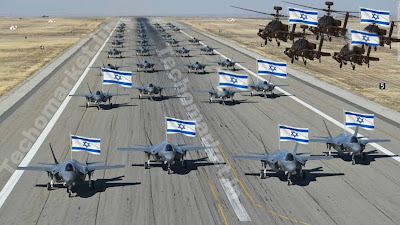What did war start in israel ? How Israel and Palestine Divided from late 19th Century? Step by step Israel and Palestine Conflict history
A complicated and protracted conflict, comprising the political, religious, and national ambitions of both peoples, exists between Israel and Palestine. Given that every war has a unique set of reasons and causes, there is no easy way to say when and how the conflict began. However, some of the significant occasions and problems that have influenced the conflict over time include:
The emergence of Zionism in reaction to the discrimination and antisemitism experienced by Jews in Europe and worldwide in the late 19th and early 20th centuries, a movement that aimed to create a homeland for the Jewish people in Ottoman-controlled Palestine.
The British government's 1917 Balfour Declaration pledged to safeguard the rights and interests of the existing Arab population in Palestine while simultaneously supporting the construction of a "national home for the Jewish people" in that region. This proclamation promoted additional Jewish immigration, which increased tensions and conflicts with the Arab population in Palestine.
The decision by the UN to divide Palestine into two states—one Jewish and one Arab—in 1947. The Arab leadership rejected the proposal, claiming that it violated their right to self-determination and that it was wrong to give the Jewish state more territory than the Arab state. The Jewish leadership adopted the idea.
The founding of Israel in 1948 and the conflict that ensued and came before it, during which Egypt, Iraq, Transjordan, and Syria invaded Israel. The armistice agreement that concluded the war in 1949 provided new borders for Israel that granted it more land than it had been allotted under the UN partition plan.
War history of Israel-Palestine
The approximately 700,000 Palestinians who were forcibly removed from their homes in what is now Israel. They either relocated to nearby nations or to Jordan and Egypt's respective occupations of the West Bank and Gaza Strip, respectively. The Nakba, or "catastrophe," is how the Palestinians refer to this occurrence, which they view as a grave injustice and violation of their rights.
Israel's 1967 Six-Day War conquest of the West Bank, Gaza Strip, Sinai Peninsula, and Golan Heights. Occupied Palestinian Territories (OPT) are those areas where Israel has imposed military control and started to develop Jewish colonies.
- The 1993 Oslo Accords, the product of peace talks between Israel and the PLO. The agreements acknowledged Israel as a legitimate state and the PLO as the legitimate representative of the Palestinian people.
What reason war started between ISRAEL AND PALESTINE ?
Additionally, a framework for the gradual handover of power from Israel to a Palestinian interim administration in the OPT was established. According to the agreements, a final status deal would be reached in five years and would address the main points of contention, including borders, security, settlements, refugees, and Jerusalem.
The failure of the peace process to produce a lasting resolution due to a number of reasons, including the use of force by Israeli and Palestinian forces, political unrest and corruption on both sides, the growth of Israeli settlements in the West Bank, disputes over Jerusalem and the plight of the refugees, a lack of trust and goodwill, and interference from outside parties.
The ongoing conflicts between Israel and Fatah, the PLO's main faction, over matters such as statehood negotiations at the UN, recognition by other nations, prisoner exchanges, tax revenue collection, water allocation, electricity supply, access to holy sites, and reconciliation with Hamas.
These are only a few of the major things that have happened and problems that have led to the conflict between Israel and Palestine. The dispute is intricate and dynamic, impacted by a wide range of elements, including geography, politics, economy, history, religion, culture, and international relations. Other regional conflicts including the Arab-Israeli wars, the Lebanese civil war, the Iran-Iraq war, the Gulf War, the Iraq War, the Syrian Civil War, and the establishment of the Islamic State have also had an impact on and been influenced by this conflict. several nations and organizations from across the world, including the United States, Russia, China, the European Union, the Arab League, the Organization of Islamic Cooperation, the United Nations, and several non-governmental organizations, have also expressed interest in and engagement in the war.
What did war start in any country?
Given that every war has a unique genesis and reason, there is no conclusive way to say what started a conflict. However, there are several similar elements that have sparked conflicts throughout history, including:
- Rivalry for access to resources like trade routes, minerals, or water.
- Differing ideologies, including those of nationality, religion, and political structures.
- Rivalry and hostility between nations or groups, frequently stoked by old resentments or imagined dangers.
- Alliances and entanglements, which may force nations into conflicts they had not intended or anticipated.
- Human emotions like fear, rage, pride, or retaliation, which can affect judgment and intensify confrontations.
The following are a few of the root causes of World War I:
- The growth of nationalism and imperialism in Europe, which sparked competition among the main countries for colonies and influence.
- A power relationship that was readily upset by any crisis was formed by the development of two rival coalitions, the Triple Entente (France, Britain, and Russia) and the Triple Alliance of Europe (Germany, Austria-Hungary, and Italy).
- The militarism and armaments race in Europe, which heightened nations' preparedness and desire to engage in war.
- The Balkan crisis, in which Serbia and Austria-Hungary were at odds with other governments in the area over territorial and ethnic issues.
Following the murder of Franz Ferdinand, Austria-Hungary declared war on Serbia, and Russia raised an army to aid its ally Serbia. This provoked Germany to declare war on its allies, France and Russia. Following that, Britain declared war on Germany. Belgium's neutrality was breached by Germany when it invaded. Other nations, including Japan, Turkey, Bulgaria, Romania, Greece, and the United States, soon entered the conflict on either side.
With over 16 million fatalities, World War I was one of the worst conflicts in human history. As a result, four empires—Austria-Hungary, Germany, Russia, and Ottoman—fell, as did others. New nations and ideologies—like Czechoslovakia, Yugoslavia, Poland, Zionism, and Communism—also emerged, and the League of Nations—a forerunner to the United Nations—was established to stop future wars. But World War I also laid the groundwork for another great war, World War II.
What are some possible solutions to end the conflict ISRAEL AND PALESTINE ?
A two-state solution, which would establish a Palestinian state alongside Israel, based on the boundaries of 1967, with mutually agreed-upon land swaps and a negotiated deal on the status of Jerusalem and the rights of Palestinian refugees456. The United Nations, the Arab League, the European Union, the majority of the international community, as well as several Israeli and Palestinian leaders, have all accepted this option.
The rise of Israeli settlements in the West Bank, the split in the Palestinian leadership between Fatah and Hamas, a lack of mutual trust and goodwill between the parties, and the influence of outside players are just a few of the difficulties and barriers it must overcome.
A one-state solution FOR ISRAEL AND PALESTINE , which would establish a single democratic state with equal rights and representation for all people for both Israelis and Palestinians. Some Palestinians who don't accept Israel's legitimacy or think a two-state solution is no longer possible have pushed for this alternative. Some Israelis who seek a binational or confederal vision of coexistence have also backed it.
The loss of Jewish or Palestinian national identity, the potential for violence and discrimination, and the resistance of the majority of Israelis and Palestinians, who would rather have their own separate governments, make this solution difficult and risky.
A regional resolution based on the Arab Peace Initiative of 2002, which calls for a comprehensive peace deal between Israel and its Arab neighbors. In exchange for Israel's withdrawal from all of the territories it has occupied since 1967, including East Jerusalem, its acceptance of an independent Palestinian state, and its agreement to a just solution for Palestinian refugees based on UN Resolution 194, this initiative offered Israel complete normalization of relations with all Arab nations.
A unilateral solution, in which Israel or Palestine would act alone to settle the issue without engaging in direct talks. Palestine might declare independence and ask other nations and international organizations to recognize it, or Israel could seize all or sections of the West Bank and designate Jerusalem as its undivided capital. These actions might, however, also have unfavorable effects, including as inciting hostility and retaliation from the other party, breaking international law and resolutions, and jeopardizing the prospects for a negotiated settlement.
Although not all-inclusive, these are some potential measures to put an end to the conflict between Israel and Palestine. It takes political will, fortitude, compromise, and communication from both sides and their supporters to resolve the dispute since it is so complicated and dynamic. The core causes of the war and its human consequences, including as the occupation, oppression, injustice, violence, trauma, fear, anger, despair, and hopelessness that afflict millions of people on both sides, must also be addressed. A vision for a peaceful future that respects the rights and aspirations of both peoples to live in dignity, security, freedom, and peace is also necessary to resolve the issue.
What is the one-state solution Israel-Palestine ?
One state must be constructed between the Jordan River and the Mediterranean, according to the one-state solution, which is a suggested strategy for settling the Israeli-Palestinian conflict. This solution's proponents call for the establishment of a single state in Israel, the West Bank, and the Gaza Strip. The idea that Israel and Palestine are currently in a one-state reality is known as one-state reality.
The one-state solution can be implemented using a variety of models, including:
A federal state with a central administration and federative districts, some of which would be Palestinian and some of which would be Jewish.
- A confederation, which entails two sovereign nations sharing authority and granting citizenship to citizens of the other state.
Some Palestinians who don't accept Israel's legitimacy or think a two-state solution is no longer possible have backed the one-state option. Some Israelis who support a binational or confederal form of coexistence have also argued in favor of it.
The one-state approach, however, also confronts a number of difficulties and criticisms, including:-
- The resistance of the majority of Israelis and Palestinians, who want their own independent states.
The two-state option has dominated official efforts to end the conflict, leaving the one-state alternative out of the picture. Given the present-day realities and the failure of the peace process, some observers contend that the one-state option is more desirable and practicable than the two-state one.






